The Battle for Old Big 'Ead: Did Brian Clough's heart belong to Derby or Forest?
His award-winning biographer went on a pilgrimage in 2008 to discover where Brian Clough's heart really belonged – Derby or Forest?
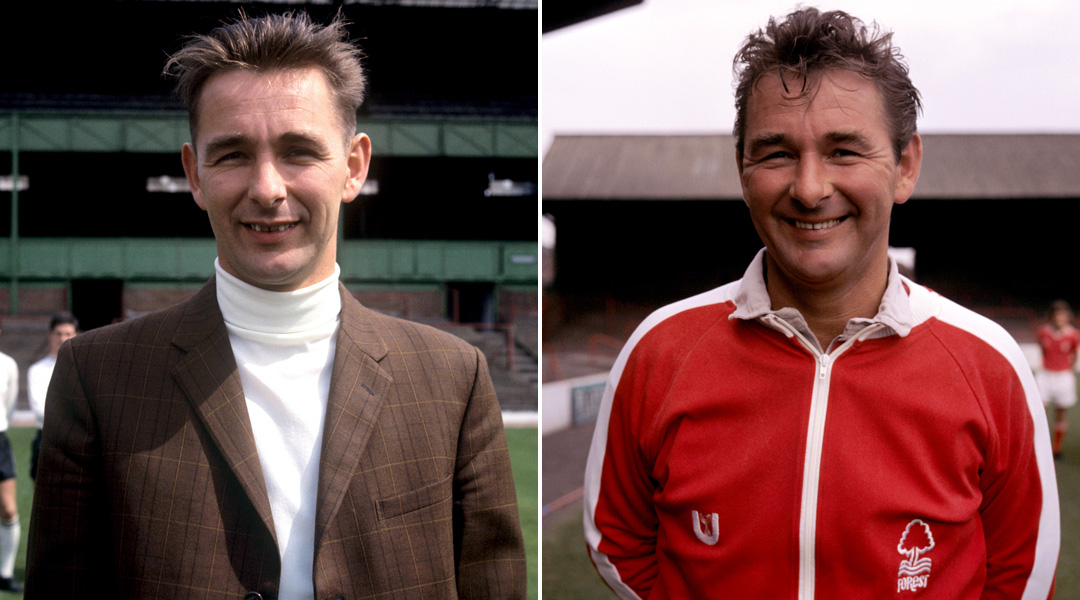
“Where was Brian Clough most at home, Derby or Forest? And where did he really belong?”
The fan pauses to consider the two-part question and takes a long drag on his cigarette. He burns it almost to the filter, and flecks of ash swirl around him and stick to the upturned collar of his windcheater. Eventually he replies, slowly, letting the butt drop from his nicotine-stained fingers onto the wet concrete, where the embers softly hiss and glow for one last time before going out. “That’s obvious, isn’t it? It’s got to be Derby, hasn’t it? He lived here, didn’t he?”
He adjusts the black woollen Derby County hat incongruously squashed on his wide head, the badge slightly askew, and fiddles with his scarf, like a nervous groom checking the knot of his tie in a mirror.
He is well into middle-age with a thin blade of a face and baggy eyes. He explains to me that he stood on the terraces in the days when the Baseball Ground was Clough’s kingdom – the pinching tightness of it of so claustrophobic that you could hardly breathe and the churned, muddy pitch resembling a ploughed field. He’d also marched in the futile, banner-waving protest to reinstate Clough after his abrupt resignation in 1973. He’d yelled until his throat hurt to demand the sacking of the board who egregiously accepted Clough’s going with such relish and lived to regret it forever.
Against his better judgment, he’d stuck loyally to Derby during their wilderness years when Clough was doing laps of honour around Europe with Nottingham Forest.
Now, eyes bright with remembering, he is waiting for the turnstiles to click open at Pride Park before the latest instalment in the perpetual private war between the clubs Clough shaped and defined in his own image. He hastily lights another cigarette, as if the smoke is nourishing him, and begins a stuttering cough that sounds like a malfunctioning pneumatic drill. After his throat clears, he is more insistent than ever. It’s as if he feels compelled to offer a final, clinching argument. “Brian is ours. No doubt about it. I’m surprised you have to ask. He was an honorary Derby man, for goodness' sake.”
The last line is said irritably and with traceable indignation, as if he’s wagging a finger in my face. The rebuke betrays how seriously Derby claim proprietorial rights over Clough, and respond aggressively to challenges to it.
The best features, fun and footballing quizzes, straight to your inbox every week.
Nottingham hero
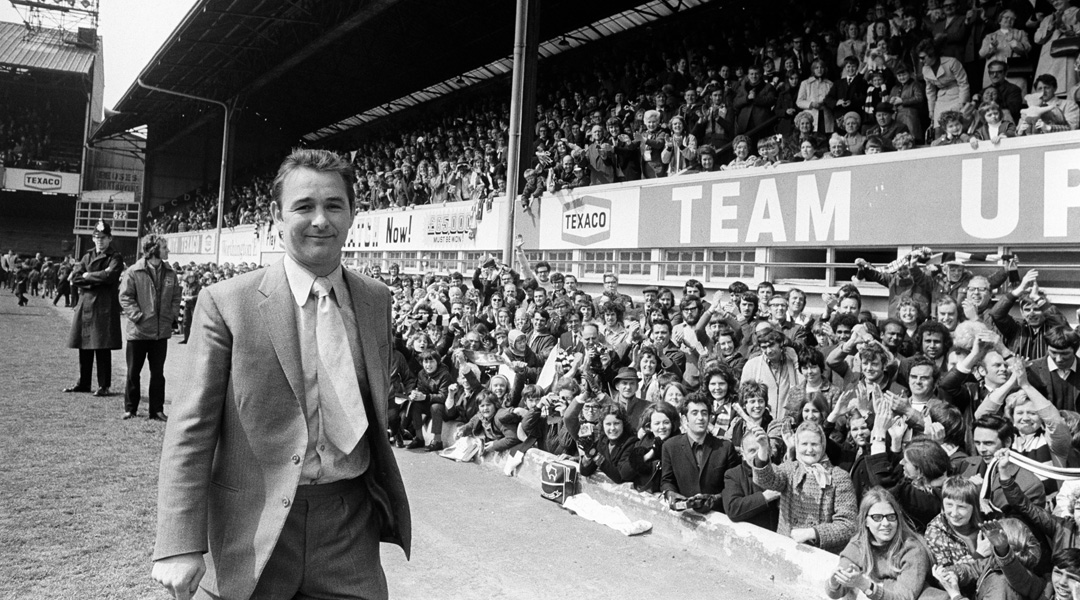
But the Forest faithful are fiercely protective of Clough too, and anxious to annexe him as their own and no one else’s. “He spent 18 years with us and only half a dozen with them,” says one fan. She is hunched against the weather, her ungloved hands thrust into her pockets for warmth. She removes them to unzip her cadmium red fleece and show off the green sweatshirt worn beneath her short-sleeved Forest shirt as a sartorial tribute to her hero. Her nails, like talons, are painted Forest red too. “He’s more us than them. Let’s face it, when you think of Brian you automatically see him at the City Ground. Everybody knows that. Derby is ancient history.”
Waiting for FourFourTwo to register the obvious truth of her statement, she adds: “He gave me a kiss once.” She points to her left cheek. “I was 13, and it was during the summer holidays. I didn’t wash my face until I went back to school four weeks later. I’ve still got photo he signed for me. He was a handsome man, you know. And he called me a beauty.”
She goes silent again and smiles, as though the sweet, dreamy moment of that kiss is being replayed on a loop of film in front of her. “That’s my claim to fame,” she adds with nostalgic yearning, the mist in her eyes as heavy as dew. It is typical of the devotion Clough inspires.
On this filthy, sodden autumn day, a thin drizzle falls from a pewter-coloured sky and wraps itself around the place like a grubby veil. A malicious wind loots the trees, stripping the branches bare around Pride Park. Leaves are flattened into the pavement by the heavy tread of 33,000 pairs of feet.
A sense of anticipation hangs in the dank air. It stems from a rivalry that goes beyond what will be compressed into the 90 frantic minutes to come.
Living on forever
There is more at stake than mere bragging rights in the office or on the shop or factory floor. For neither Derby nor Forest have ever quite got over the emotional loss of Clough. The striking thing, which almost defies comprehension, is how much he continues to matter to both of them. It was 1973 when he walked out of Derby in a fit of pique, 1993 when he retired from the City Ground, 2004 when he died. Given the timespan, you’d assume he’d have been pushed into the background by now.
He’s still promenading across the pages of umpteen books. They still appear at regular intervals, along with TV documentaries and the occasional film, like The Damned United. David Peace’s book focuses on the rows and ramifications of his 44 days at Leeds, where he claimed, only half tongue-in-cheek, afterwards: “I didn’t have enough time to find out where to hang my coat before the buggers sacked me”.
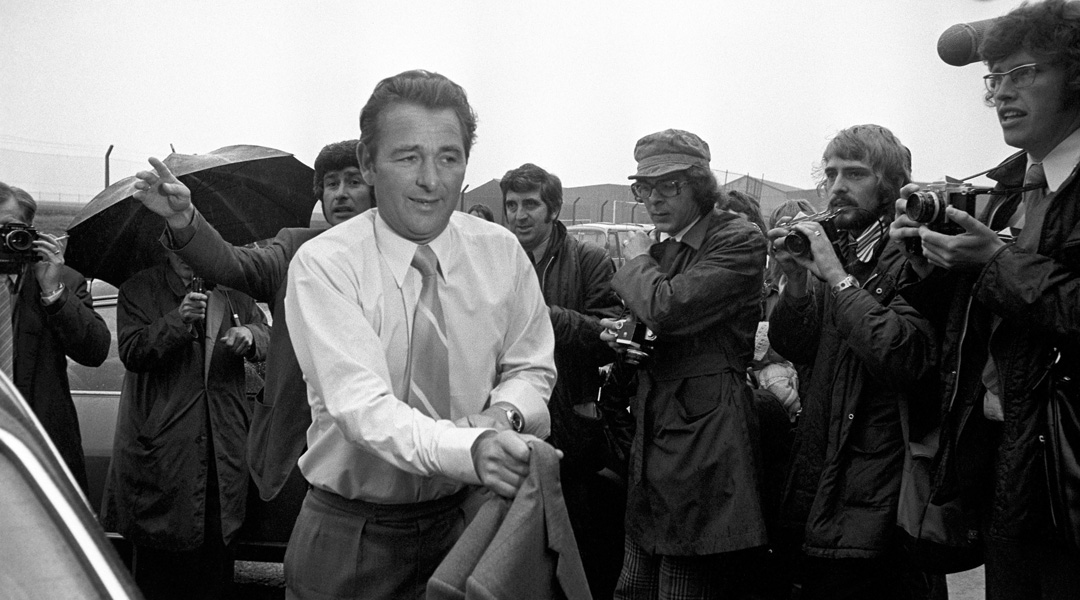
Linking Clough to Leeds will always rile his 'heartland' in the East Midlands. For his nearest and dearest at Derby and Forest are the most protective of his reputation as a man and a manager, and cling to the memory of him the way Miss Havisham clung to her wedding dress and her cobwebbed room. It isn’t cloying sentimentalism that binds them to Clough, the constant harking back to a golden yesteryear that has gone and will not come again. It is profound respect and unqualified admiration. Clough was Derby – the flesh and bone and breath of its football. And he was Forest too – every sinew of him.
You can find the proof during a gradual, circular stroll of Pride Park nearly two hours before kick-off. Grab whoever you can and ask them about Clough. Some Forest fans have emerald enamel badges pinned to their coats, worn as reverentially as Remembrance Day poppies. The name CLOUGHIE is arched in gold letters beneath a large, white figure ‘1’. Others chant about ‘Cloughie’s army’ and his ‘football genius’.
Whoever you stop speaks about him longingly, and with tenderness, as if they’ve been waiting for the chance to have their say. The themes are predictably common.
Promote, berate and cajole
They remember his arrival and resuscitation he performed on each club before promotion from Second to First Division improbably followed. They recall the championships, the European Cups and the swagger. They remember the aesthetic, expressive grace and discipline he demanded from his teams, the easy way passes were threaded together like pearls on a necklace. And they remember the unmistakable nasal twang to the voice and how it was used to promote, berate and cajole – often simultaneously.
Clough was born adhering to Oscar Wilde’s principle that it is better to be talked about than not talked about at all, and so became an expert in the art of self-promotion. Other managers struggled with words as if language was a difficult piece of heavy machinery. Clough sharpened it like a weapon. In mouth-to-mouth combat, he could beat anyone – and always did. He could make today’s billionaire Premier League owners and multi-million-pound agents shake in their hand-made shoes.
Because of all this, Derby and Forest’s egos collide over The Brian Clough Trophy, which was inaugurated in a ‘friendly’ in 2007. The fans travel along Brian Clough Way. There’s a Brian Clough statue in the centre of Nottingham, and another at Pride Park. The perfect location for it – directly outside the main entrance – is as obvious as the X on a treasure map.
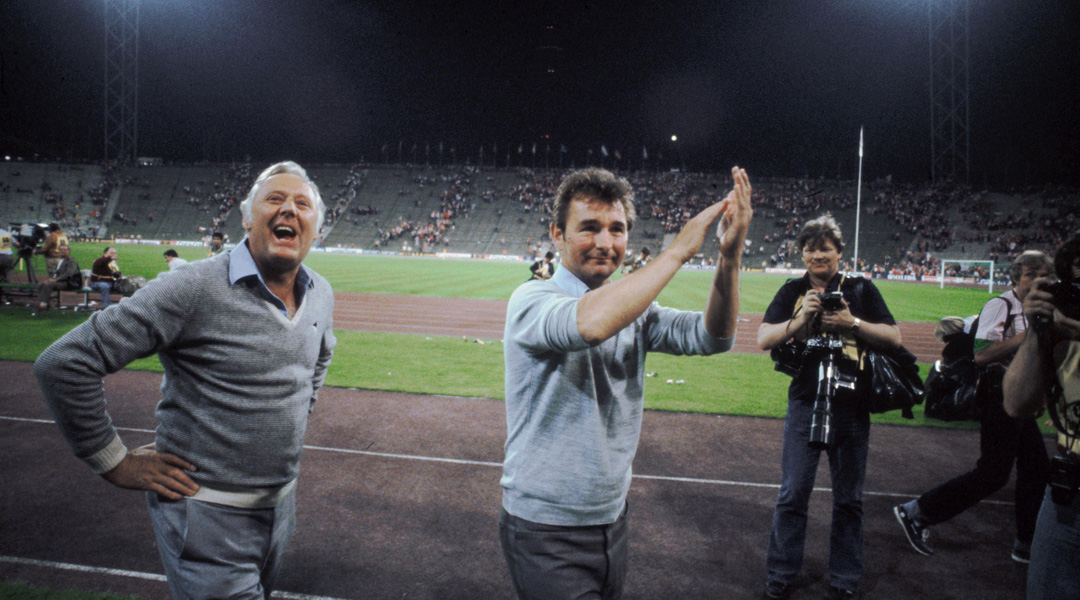
So forget the geography: the fact that just 16 miles separate Derby from Nottingham. Forget history and tradition too: the fact that the feud has been going on since Gladstone was Prime Minister. Forget even, the immense pressure to win from both sets of fans. These seem almost secondary. What Derby and Forest essentially fight over is ownership of Clough’s heart, and for an approval he can no longer give.
Here are quite separate, independent and disparate families, who have the same father. Each one is convinced that he loves and cherishes them far more than the other sibling. And each one is determined to prove it.
Irrelevant into champions
The line chart of Clough’s career reveals why. It is like a seismological map – the modest but noticeably upward turn at Hartlepool, the vertical plunges into troughs at Brighton and Leeds, and the high leaps at Derby and Forest. He gave them their identity. Without him, they would have remained football backwaters, unfashionable and ignored and mentioned only during the classified results.
Clough performed the same trick twice. He cut his cloth in identical fashion. He took over drifting, downtrodden and exhausted looking teams. To revive them he bought or developed players, relative unknowns, who were underrated or regarded as irrelevant elsewhere. At Derby, it was Roy McFarland and Colin Todd, Archie Gemmill and John McGovern. At Forest, it was Kenny Burns and Larry Lloyd; and he nurtured John Robertson and Viv Anderson too.
He preached simplicity, refusing to clutter the minds of his players with jargon or convoluted tactical theories. He focused tightly on the virtues of his own team rather than the damage the opposition might inflict. He was zealous about the importance of clean sheets, constantly repeating, “You get nowt and go nowhere if you concede goals”.
The charge against him was that he ruled by fear. It didn’t stick because it wasn’t true. The force he ruled by was his own pyrotechnical personality. As a consequence of it, the mark he left on Derby and Forest is indelible; it doesn’t wash off.
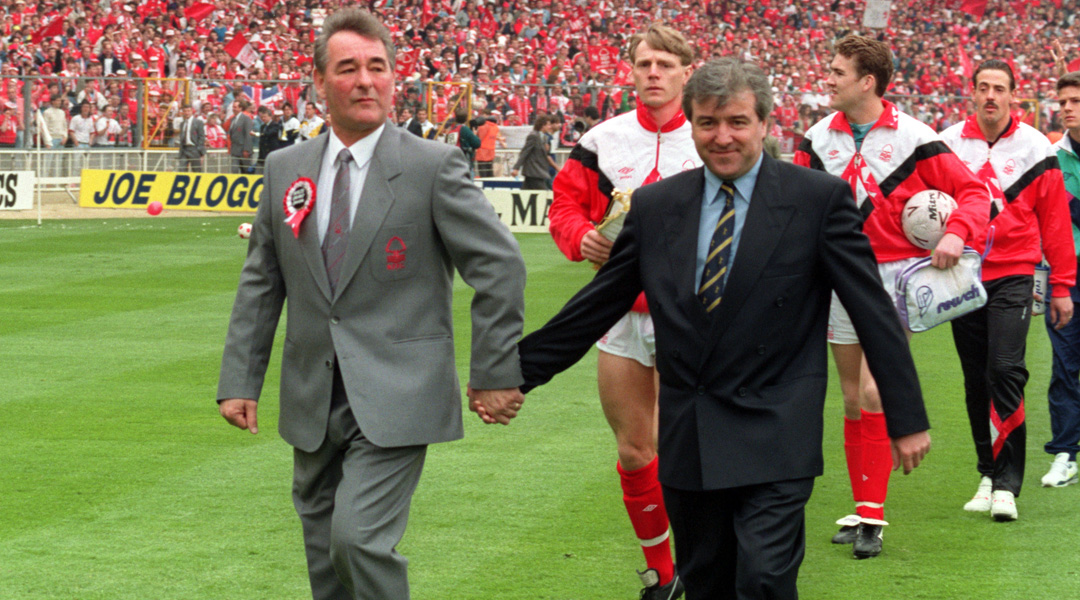
Opposite the station, in the warmth of the Waterfall pub, even the young generation of Derby-ites are Clough converts. The room is choked with drinkers, clustered six-deep around the half-moon bar. All eyes are fixed on the flat screen TV, silently tuned to Sky Sports News. A group of half a dozen men in their late-teens and early-20s consume lager in large, long gulps, their mouths opening and closing like ornamental fish in a tank. Six fresh pints stand temptingly on their table, already soaking from the water-rings left by previous rounds. Not one of them was born in the heady decade when Clough won the title for Derby and then repeated it at Forest. But each was weaned on old videos, played until the tapes become worn and useless, and listened to all the anecdotes – some real, others mythical – from their fathers.
“There’s no one like him. Me dad says we should never have let him go,” says a lean lad with his hair cropped tight across the neck. His scarf is tied around his waist. “He told me that if Cloughie had stayed, we’d have been the Liverpool of the ’70s. We had all those players: McFarland, Gemmill, Hinton and Hector. We were the team back then.”
Someone else joins in, putting down his pint to grab at the crest on his replica shirt, as if doing so reinforces his allegiance. “We’d have won the European Cup instead of Forest. As a manager, he’s unbeatable. That’s why everyone who comes to Derby finds it so difficult here. We always want another Cloughie. The problem is there isn’t one, really.”
Always present
It’s noticeable that almost no one talks about Clough in the past tense. The recollections of him are so vivid that it feels as though he is everywhere you look.
He’s beside those drinkers and listening to what’s being said. He’s strolling through the grey retail park on his journey to the ground. He’s sitting on the lip of a seat inside it. Sometimes he’s on the touchline too – stabbing his right index finger into the air, yelling orders with one hand curved around his mouth, like a fairground barker. If someone impresses him, he gives a thumbs up. If someone lets him down, he casts them a stare like a dagger.
And, of course, he’s wearing his green sweatshirt. But then he always will: for that’s the gilt-framed image preserved by the people who adore him. Time hasn’t robbed him of his looks or made the skin slack on his bones. His hair is thick and swept back. His face is unlined. The eyes gleam again.
It is impossible to watch a match between the two clubs without wondering what he’d have made of it. Not much, you suspect, of this November 2008 fixture - an unsatisfactory 1-1 draw that failed to do him justice. The fizzing spirit that Clough brought to both clubs was lamentably absent. Even taking into account nerves and the attritional nature of derbies, the game slides below average Championship standards.
In the programme, The Big Interview and centre spread pin-up is Kris Commons, who the previous summer switched his allegiance from Forest to Derby. “I’m expecting my fair share of boos,” he confessed. Scarred by misplaced passes and incoherent moves, the first of four derbies to be played in 2008/09 was only partly redeemed as pure entertainment – and will consequently linger in the memory – because two callow, wretched refereeing decisions greased its final three minutes in high farce and controversy.
There was a concerto of whining afterwards. As Clough never made private thoughts about referees public, I know he wouldn’t have fallen into the trap of berating 25-year-old referee Stuart Attwell for his naivety in handing Derby a dubious penalty and then ruling out their injury-time goal, which was obviously legitimate. You could watch the slow-mo replay of Miles Addison’s header until you went cross-eyed with the effort and still not see anything wrong with it. Attwell was removed from the referees list for the following weekend, which Clough would have considered as punishment enough.
The neutral’s sympathy is reserved for the supporters who suffer convulsing agonies as a consequence of Attwell’s shortcomings. Derby’s fans wore free paper masks in the shape of rams’ heads. At first, these are waved like fluttering handkerchiefs. By the time Forest’s keeper Lee Camp had saved Nacer Barazite’s spot-kick, and Addison’s header was chalked off, the masks had real purpose: to disguise the depth of their misery.
Follow that
Of course, the story doesn’t end there. Those tasked with following Clough have almost always told tales of woe about it afterwards. Colin Addison, who tried to compete with him at Derby, described doing the job as living under the “Clough curse”. At Forest, Joe Kinnear wearily complained that Clough was mentioned far too often: “You get the history rammed down your throat. You can’t break wind without names like Clough’s being mentioned”.
The truth is it always will be mentioned. The standard he set and the legacy he left make it naive to assume otherwise. Successors have perished as a result of it.
This is why, just weeks after the aforementioned fixture at Pride Park, Forest’s manager Colin Calderwood was sacked and Derby’s Paul Jewell handed in his resignation. Two more names added to the ever-lengthening list of post-Clough casualties. Since Clough, Forest have gone through bosses faster than Henry VIII got through wives. With an ironic twist, Calderwood’s replacement was Billy Davies, who had previously left Derby to be replaced by Jewell. More poignant is what happened at Derby, where the new manager – the 15th since Old Big ‘Ead – was Nigel Clough. Son at last followed father.
Having spent an enormous slice of my life with his old man – I followed Forest for the Nottingham Evening Post – I know he would have been ecstatic about the appointment. Clough was conscious of the need to share his affection equally between Derby and Forest. Although he won more, and stayed longer, at Forest, it nonetheless always struck me that he regarded his experiences at Derby as more uniquely personal and intimate to him, which was probably a contributory factor in his refusal to go back there in 1977 and again in 1983 when his former partner Peter Taylor tried to tempt him. I think he knew that it would be impossible to re-create what he’d once had.
Confirmation came shortly before his death. “I wish I’d never left,” he said, of a decision he took 30 years earlier. “It was the best job I ever had… Some of my heart, wherever I have wandered, was in Derby.”
Clough’s heart is still there. But if you ask me to whom Brian Clough really belongs, I’d say unhesitatingly: to football, and the people who cherish it.
